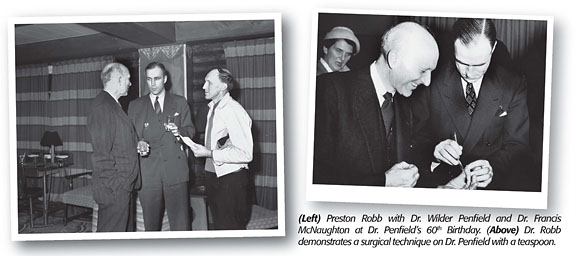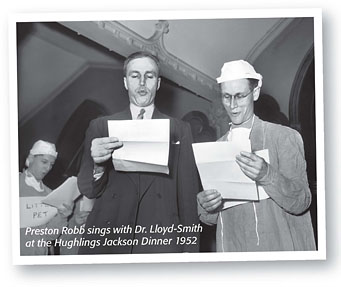
Robbís research started with work in language localization with Wilder Penfi eld, whom he held in high regard, and he wrote about neurological complications of pregnancy, motor disability and various paediatric neurological problems. Above all, he pursued a lifelong interest in epilepsy. In 1964 he followed the call of his friend, Richard Masland, to the national Institutes of Health in Bethesda. After a stint there he travelled extensively, surveying facilities for the treatment of epilepsy across the United States and Canada. These travels culminated in a volume on the epidemiology of epilepsy entitled Epilepsy: A Review of Basic and Clinical Research. He pioneered the cooperative epilepsy studies launched by the NIH. His work set the stage for the centres of excellence for treatment of epilepsy created across the United States. Robb was greatly concerned about the creation in underdeveloped countries of treatment facilities for epilepsy and other neurological disorders. He trained many neurologists from Africa, Asia, and South America, and towards the end of his career served as visiting professor at the University of Nairobi. His exposure to the hurdles that must be overcome before epilepsy can be effectively treated in Third World countries left an indelible impression. Upon his return to Canada he wrote a practical text on the subject for paramedics and other health workers which has since been translated into Chinese, Spanish and Portuguese. His papers were a model of style and always to the point.
 Robb was a founder and president of
the Canadian Neurological Society
and President of the American
Epilepsy Society. He received the William Lennox Award from the AES and became
chairman and medical advisor to many organizations, including the Presidential
Advisory Board of the Epilepsy Foundation of America, The US Public Health
Service Advisory Committee on the Epilepsies, and many local centres.
Robb was a founder and president of
the Canadian Neurological Society
and President of the American
Epilepsy Society. He received the William Lennox Award from the AES and became
chairman and medical advisor to many organizations, including the Presidential
Advisory Board of the Epilepsy Foundation of America, The US Public Health
Service Advisory Committee on the Epilepsies, and many local centres.
Robb was an example to his juniors in many ways, none more so
than in his family life. His marriage to Mary Waller was a particularly happy
one. She had been a head nurse at the Montreal General Hospital.
Beautiful, kind, warm and endowed with faultless social judgement,
she eased her husbandís